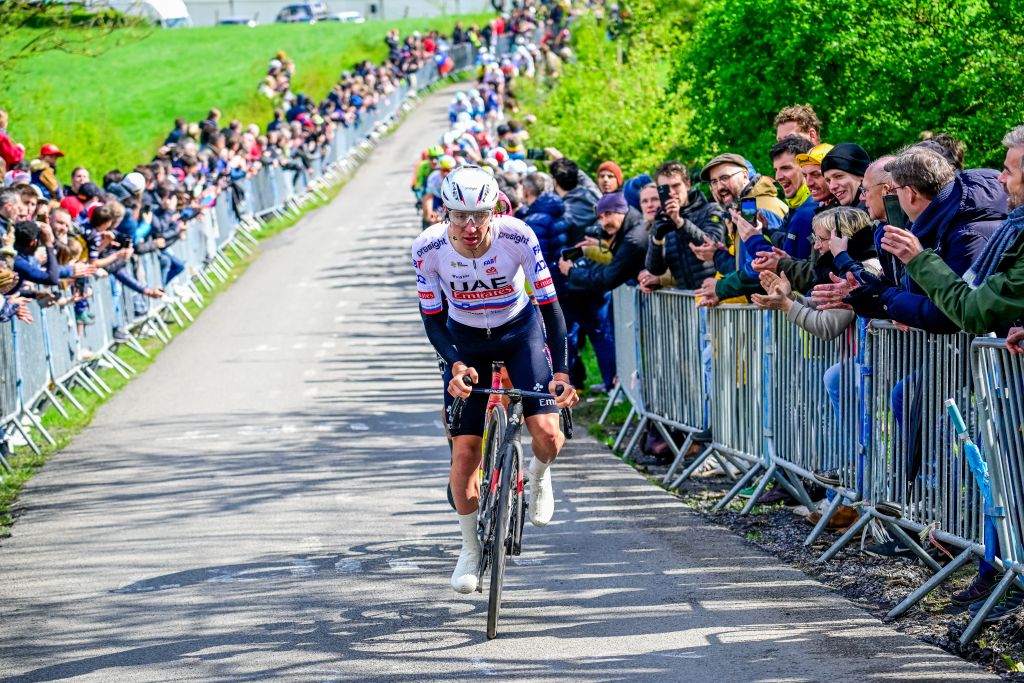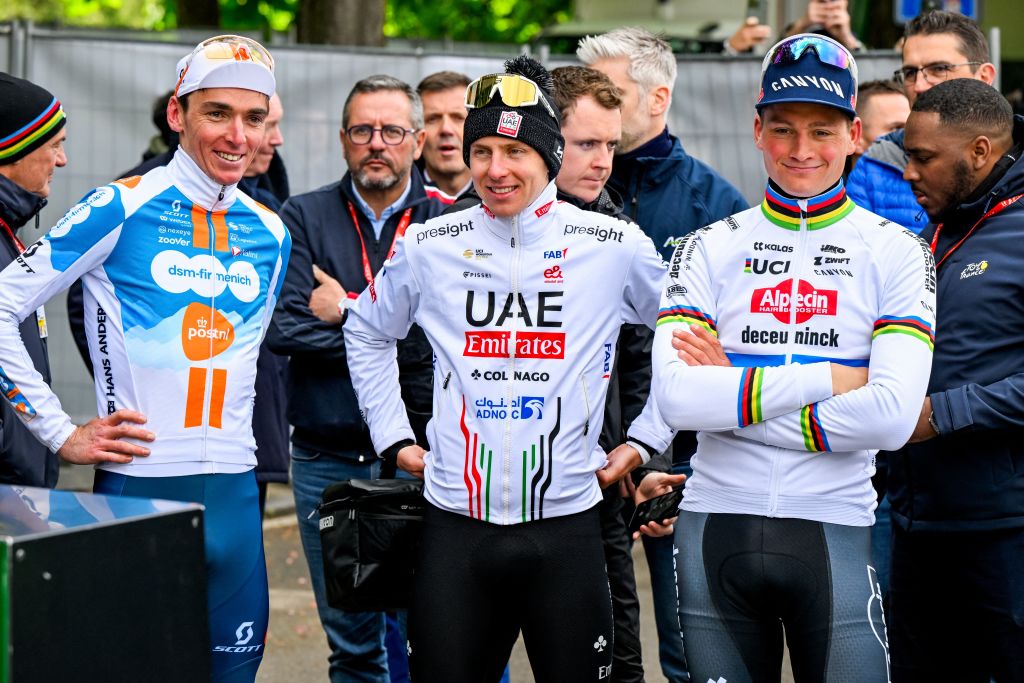
The French have a really appropriate saying for when a favourite controls the race to such an extent that you can only admire what happened. The 110th edition of Liège-Bastogne-Liège was a perfect example of what they call “une démonstration.”
Rarely in professional cycling does the plan that was so carefully worked on beforehand and then drilled into the riders in the pre-race briefing follow that script to the letter. Somewhere along the route, there’s usually a mishap of some sort or a tactical move from the opponents that disrupts things.
For UAE Team Emirates on Sunday, there wasn’t one off-key moment, not even close. The last two editions of the oldest of the Classics have seen the big decision made on the climb of La Redoute, and so no one was going to be surprised if Tadej Pogačar applied maximum pressure onto his rivals somewhere on those hallowed slopes.
It’s always been a crucial point of the race and that’s why the crowds flock there, because they know that’s where they’ll get the best chance to see everyone suffer. It’s a horrible climb that few get over with all their faculties intact. Although you already have an idea by then of how your day is going from the preceding hills, the gradients of La Redoute provide the confirmation.
Therefore, when the UAE riders set out from Liège in the freezing cold, little could they have imagined they would be delivering their leader in prime position to the predetermined spot just outside Remouchamps with only the conditions having really challenged them.
The early break’s lead hovered from a couple of minutes to a maximum of just under five, but it was never going to survive the relentless pace being set by Pogačar’s team and from an equally determined Israel-Premier Tech, who were thinking that Stevie Williams might be capable of replicating his Flèche Wallonne form.
The Welshman, however, hadn’t coped with the conditions as well as the Slovenian favourite, who was quite happy that it was fast enough to keep him warm but not so fast as to have him overly stressed. For those who were suffering or ejected out the back of the peloton, that must have been a rather stark statement.
Pogačar doesn’t often get out the saddle, but even by his standards, the acceleration at the very beginning of La Redoute was brutal. Ben Healy tried to follow and couldn’t. Richard Carapaz, sensing the danger, briefly got across but then blew as the steepest section sucked the momentum from him. And that was that. Game over in the space of 800 metres.
Twenty seconds of a gap by the top corner confirmed Pogačar’s supremacy and unless there was a miracle of some sort like an immediate mechanical, then the podium places were all that was left to fight over behind. All hope of a showdown with any of the contenders was gone. They knew it and Pogačar made it more evident on the final climbs by taking more time, even though behind they were flat out attacking each other.
The level he was operating on was remarkable. His lead steadily grew from one minute towards two minutes, and he still looked like he was in complete control of the effort. I’d go as far to say that he probably only rode near his maximum for 20 of the 254km on offer, from the bottom of La Redoute, obviously, to the summit of La Roche aux Facons. From there, he cruised to the line, never in the red zone unless he chose to be.
Of course, circumstances after the massive crash with 97km to go were on UAE’s side, as main rivals like Van der Poel and then Tom Pidcock were distanced, though we’ll never know how things might have panned out otherwise. Their return to the main group was costly on a personal level and in terms of using up teammates, but given how Pogačar rode the finale, I don’t see much change to who the winner was going to be.
That was quite clear from the reaction, or lack of it, among the chasers, who were resigned to the knowledge that podium places were the best they could do. In their defence, that was a decision that had been made for them by the guy disappearing up the road.
It can be quite intimidating racing against a rider who you know can out-sprint, out-climb and out-time trial you, and even more so when they have back-up riders to monitor any attempt at an organised chase behind. Marc Hirschi was in the Bernal group and João Almeida was with the Van der Poel and co until the last climb. That, along with the lack of cooperation between the rival team leaders, ensured things worked out perfectly for UAE and Tadej Pogačar.

The chasers
If we remove the winner from the equation, then, there were a number of positives to take from Liège-Bastogne-Liège, most striking being the presence of one Egan Bernal at the very front of such a hard race. He wasn’t just content to hide in the wheels, either, he was provoking moves and reacting to other strong attacks. That’s a big plus for Ineos Grenadiers for the rest of the season and will go some way to alleviate the what ifs that came with the Pidcock’s mechanical at just the worst possible time.
The team did panic slightly when they parted company with the Van der Poel group and chased on by themselves, but they took a risk and weren’t to know that there would be an easing that saw the Alpecin riders return to the front as well. That cost Tom Pidcock energy which he then didn’t have in the last hour.
The same could be said for the Van der Poel, though his was an error of positioning prior to getting caught up in the big crash. The race was entering the first phase of accelerations, with the trio of climbs of the Wanne, Stockeu and Haut Levée coming one after another. That was always going to be a difficult passage for him, and it was made more so with Israel-Premier Tech forcing the pace.
These are the sections were Van der Poel’s rivals would have put the hurt on him anyway. He eventually made it back before the Rosiers and Desnié ascents, but despite a slight lessening of intensity before the assault of La Redoute, he hadn’t recovered enough resources to react to the Pogačar attack. Probably a wise move given that those who did ended up deep in their red zones. He rode to the best of his abilities on the day and grabbed a podium at the end. It could have been a lot worse.
Romain Bardet’s second place was a reminder that the Frenchman’s tenacity remains intact. A combination of experience and good form meant that once he distanced on over-eager Ben Healy on the Roche aux Faucons, he knew the squabbling in the chase behind would start on the last part of that climb. Closing any gap on the final ramp is excruciating so if he survived with 15 or 20 seconds then it was likely nobody would be willing to sacrifice their own chances to close him down. His smile at the finish was as large as Pogačar’s and rightly so.
Maxim Van Gils and Mauri Vansevenant ought to be happy with their showing despite missing the podium. Van Gils was amongst the strongest in the chase group, and Vansevenant had been caught up in the major crash and was then with Pidcock when he accelerated on the Stockeu in an attempt to get back to the peloton as quickly as possible. The Soudal-QuickStep rider didn’t have an easy day at all, but he rode really well.
And who didn’t get what they wanted from the race? Firstly, Israel-Premier Tech, who pulled on the front with expectations for Stevie Williams, but there seemed to be a lack of communication somewhere because the Welshman was suffering and wasn’t in any shape to influence proceedings.
EF Education-EasyPost were properly active in the finale, with Ben Healy and Richard Carapaz trying numerous times to escape the clutches of their companions, but none of it paid off in the end, as they were the last two in the 25-man group that sprinted for third place. At least they tried and showed a certain amount of initiative. Maybe on a less brutal day they would have been rewarded for their efforts, but as is the case in the Classics, you often come away with nothing but an honourable mention.
A look at the composition of the group that finally sprinted for the last podium place tells you almost all the pre-race contenders were in it, and some of the younger generation stepped up too. Romain Gregoire, Antonio Tiberi, Kevin Vermaerke and Paul Lapiera were alongside solid riders in the way of Pello Bilbao, Valentin Madouas, Alexey Lutsenko and Bauke Mollema. They’ll have learned some of things you need to know in the future. But for the moment, none of them are riding the same race as Tadej Pogačar.







